#was an interesting development in the strip’s use of women
Text
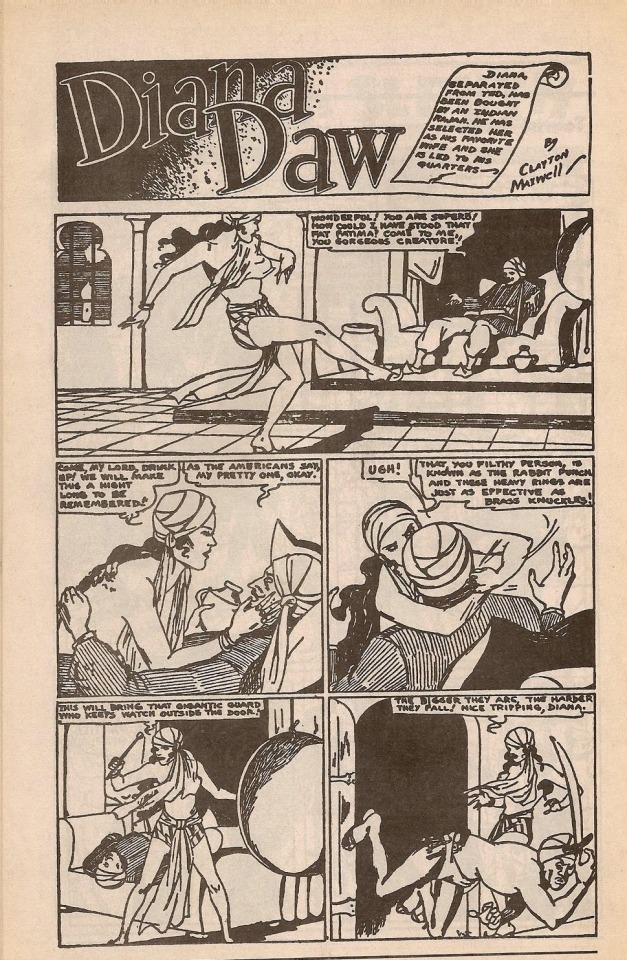
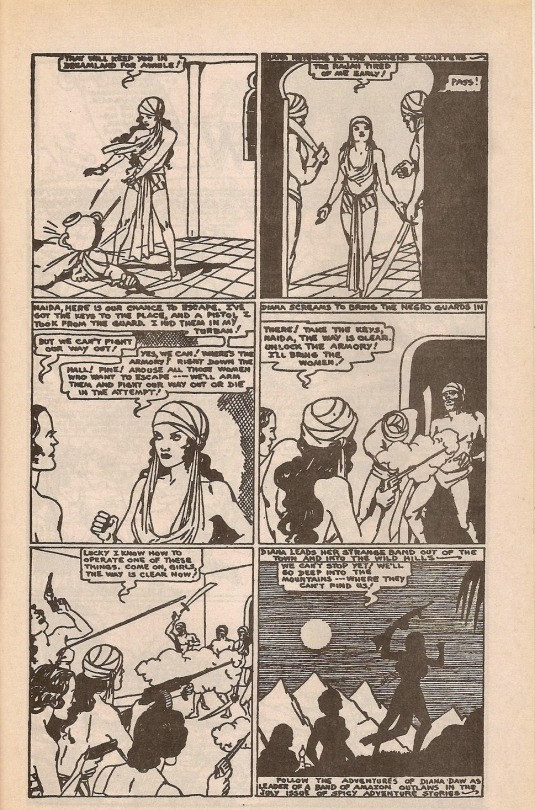
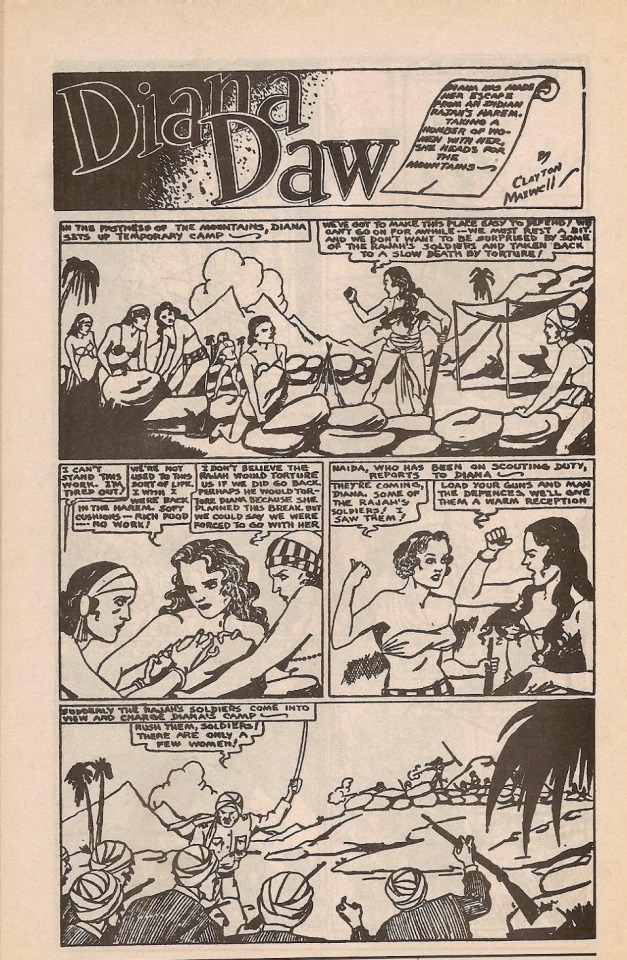
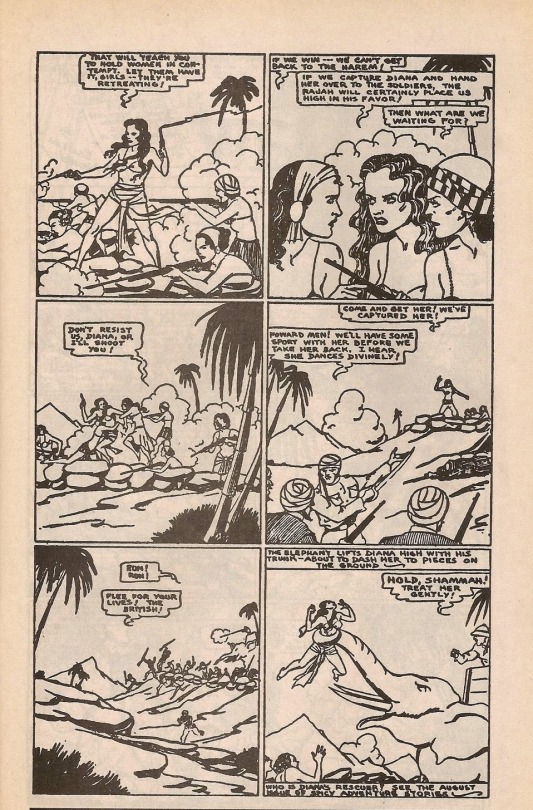
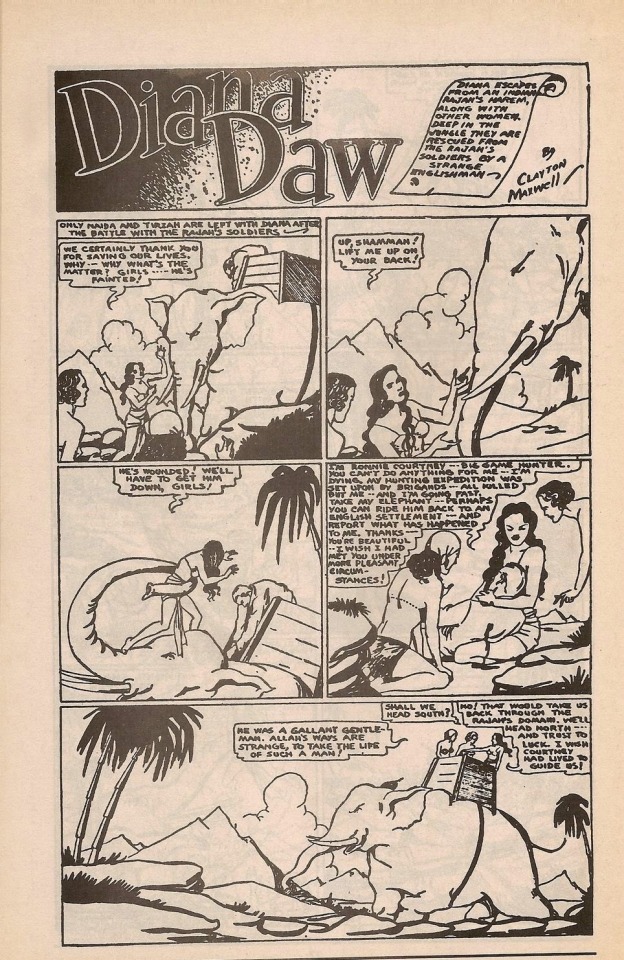
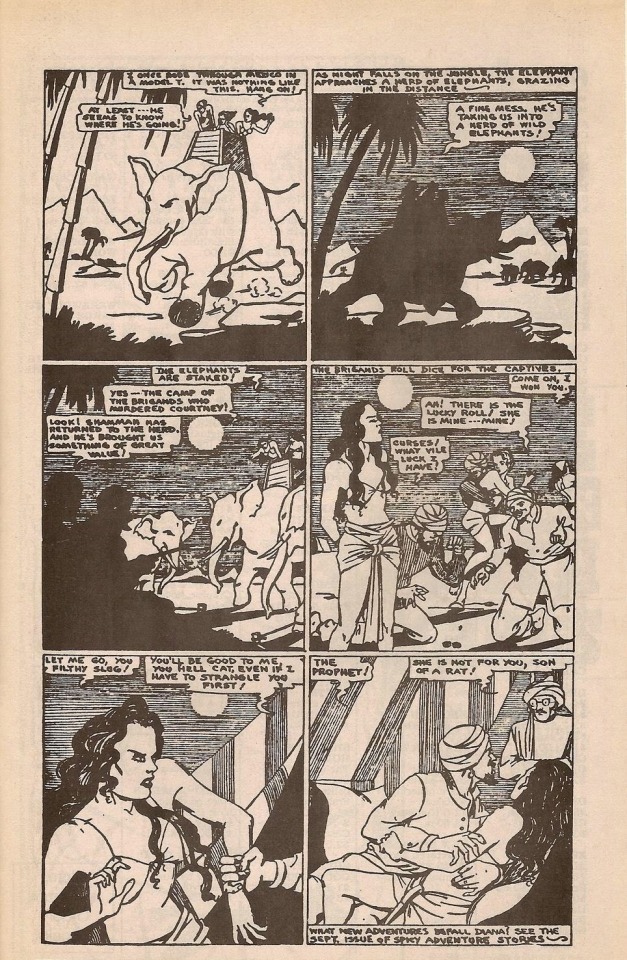
Spicy Tales (1988) #12, reprinting stories from the June 1937 to August 1937 issues of Spicy Adventure
#well Diana escaping a harem with a bunch of women instead of just by herself#and then trying to lead them in battle against their previous captors#was an interesting development in the strip’s use of women#up until they had some of them turn on Diana with the intent of going back to the harem#at least a few of them have stuck with her#I think that’s actually the first time we’ve had non-villainous women except Diana#which is y’know because she’s the only white woman in the strip#this is actually the first time we’ve had non-villainous characters that aren’t white period#well the rare good non-white characters have so far always become villains so we’ll see if this will actually be an exception#eternity comics#spicy tales#diana daw#my posts#comic panels#racist stereotyping tw
0 notes
Text
They took my clothes from me. I wore a gown of ivory lace, with freshwater pearls on the bodice, but the septas laid their hands on me and stripped me to the skin. My cousins too. Megga sent one septa crashing into the candles and set her robe afire. I fear for Alla, though. She went as white as milk, too frightened even to cry.
My cousins? Alla and Megga are hardly more than children. Your Grace, this . . . this is obscene. Will you take us out of here?
i dont have anything to say about this besides it’s horrifying, it’s horrible and despicable that a sixteen year old teenager has been left in the position of “adult” and is more worried about her cousins because alla is only thirteen. it’s sooooo much and then there’s MORE because while cersei is gloating over what she sees as a win, she has no idea that these dudes also see her as nothing but a slut and an idiot just like every other woman, and all this torture she’s laughing over is about to be turned into her and she can’t stop it because she got rid of the ability to stop it so margaery would have bo way out. and now neither does cersei. like yeah she’s got her evil advisor and bestie qyburn who is going to get her out of this but god, cersei margaery alla elinor megga just get completely humiliated by all the men around them and it’s not only legal, they all think these women deserve it for *vague mumbling*
Margaery stared at her, then pulled her hand away. "Is that a jape? Boros is a craven, Meryn is old and slow, your brother is maimed, the other two are off in Dorne, and Osmund is a bloody Kettleblack. Loras has two brothers, not six. If there's to be a trial by battle, I want Garlan as my champion.”
This is really interesting to me because of course Margaery understands the situation she’s in, for all that everyone throws (deserved) criticism at Mace for pimping his fourteen year old daughter to every baratheon he could get his hands on, it’s clear margaery’s political education was not stifled by her father the way cersei’s was by both tywin and robert. she plays up a sansa-esque sweet innocent maiden taken in and eating up every line thrown at her because she knows it’s the only personality cersei won’t actively try to beat down but once it sinks in that it’s really hopeless, she simply stops trying. this little moment, margaery taken aback at how cersei really does think margaery is a fucjing idiot is the moment i think her mask finally slips and what’s left is a perceptive and bitchy-as-only-a-teenager-can-be girl who is no longer interested in wasting time trying to get cersei to like her. i’m really interested in how their relationship develops in twow before whatever the hell it is that happens happens.
#cersei lannister#margaery tyrell#gender politics in asoiaf#rani liveblogs asoiaf#what’s that sansa post that’s like ‘he understands girlhood perfectly and then u remember he’s a 70 year old man’#losing my mind over the nuances in gender performance going on here & forgetting george is a man from jersey akskdjdj#aksksks
262 notes
·
View notes
Text
Due to a unique confluence of dashboard alchemy this March 15th (A Merry Ides to those that celebrate 🗡️🗡️🗡️) I had an interesting thought regarding fallout new vegas:
If you strip away the rhetoric and the goofy football pads, you'll find that the fundamental motivating factor of Caesar's Legion is male insecurity, with everything from how they treat women to their primitivist view of technology drawing from the same fear of immasculization that fuels all "redpill" movements.
(This is to say nothing of the use of roman iconography and the "retvrn" dogwhistle about abandoning modern "decadence" and harkening back to the rigour of an imaginary past)
This casts Caesar as our Andrew Tate figure, a charismatic ideologue who pitches a worldview that promises to impose order on the frightening chaos of reality. His philosophy is a salespitch targeted directly at his listener's insecurities but meant only to benefit him: " you are afraid of being weak. I know what strength is, listen to me. by internalizing my words and spreading my message you will become strong." Of course the difference is that Caesar's empire is built on expansionist violence where Tate's is built on insecure teenagers feeding misogyny into the algorithm for the sake of engagement. Either way it creates a hierarchy that doubles as an information bubble, where position within the hierarchy is determined by who best can adhere to/rebroadcast the leader's message, identical to how an mlm ships product.
This quite fits with a watsonian reading of fallout: the wasteland is a hostile and terrifying place formed in the shadow of an objectively failed 50s (styled) traditionalist patriarchy. Though society may have collapsed, the people who survived inherited that society's rigid view of what a man should be like (strong and driven by the acquisition of material and status) a view largely incomparable with the new environment (starvation, radiation, and mutant dinosaurs will kill you no matter who you are or how much stuff you have). Since institutionalized masculinity had failed, people in the wasteland were forced to look for new paradigms of what masculinity (read: strength) looked like, a void into which Caesar's ultraregresive worldview fit perfectly.
From a doylist perspective however, I'm not sure the writers were really thinking about gender all that much during the rushed development of FNV. Like just about every other aspect of legion society that wasn't cut for time, everything about them seems to be evil for the sake of evil. However If there's one thing you can say about the underbaked concept it was a real hit with social regressives incapable of reading deeper. Unironic pro-legion discussion of Caesar's ideology has been an on ramp to turn insecure nerds into fascists the same way that ideologies like Caesar's have been turning insecure jocks for decades. It's poe's law in action: the developers gestured at fachism but failed to do enough with it to prevent a portion of their player base from becoming radicalized.
131 notes
·
View notes
Text
Uncommon Simon Ghost Riley (mostly for OG than Reboot) Headcanons that I find realistic.
1. Social Anxiety and Communication Issues. Simon finds it difficult to communicate with people outside his field of work, especially women. He doesn't have much experience with them and he is afraid to be perceived as a freak. However, women are usually afraid of him, sometimes curious, but keep away, feeling this sense of uneasiness, awkwardness around him. It is simply because he doesn't know how to be a so called normal person. Nothing about him is quite normal. Military has always been a significant part of his life, of him entirely. He doesn't know what to talk about or even finds civilian life boring. Every time he is on a shore leave he feels like an outsider among the locals. He keeps to himself to save himself from a conflict or an embarrassment. But if he gets comfortable enough around someone, he can be perceived as a very interesting and intelligent person. Simon usually gets rid of this anxiety by drinking. A little bit of alcohol percentage really makes him a normal person.
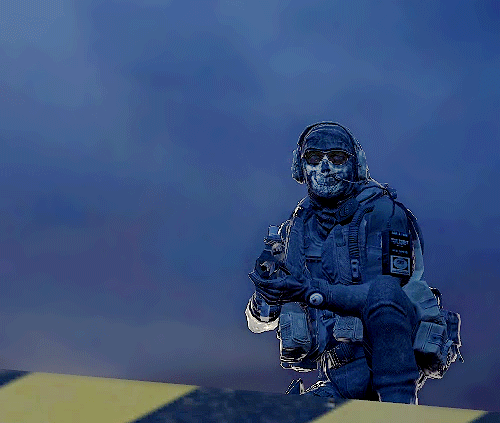
2. Soldier intuition and reflexes. It helps him a lot and sometimes... It causes trouble. Intuition sure saves his life in tricky situations and also this same intuition makes him read the signs wrong and cause a misunderstanding, a fight or a conflict, especially around civilians. Let's say, he casually activates his fight or flight response. Not always, of course, but there are some instances that make his life a lot harder than it has to be.
3. Adrenaline addiction. He is very paranoid. Always ready for a fight. Maybe even looking for it, looking for trouble. Civilian life indeed is boring for him for this lack of adrenaline release, so sometimes he intentionally escalates situation to let out some steam, despite being a very calm person by nature. (IDK maybe that's why he still lives in Manchester, there's always trouble).
4. PTSD. Yes, he suffers from it. Especially after Brazil and Rojas. He's been tortured psychologically, physically. Beaten up, raped, buried alive with a corpse. And he fucking survived. It didn't make him stronger, it broke him. It killed something that doesn't let him step away now. This very mission has branded him, cursed him to go on and never lay down his weapon. There's no way back from battlefield for him. He has nightmares, but tries to cope with them. Most of the time he is to tired to have a very emotional reaction to such dreams. And he wears himself down to have a dreamless sleep.
5. He knows a bit of Spanish and Portuguese. And he understands when locals speak these languages, he can read and easily communicate, but he prefers to not show off this skill too much, this is a tactical decision. The less enemy knows about you, the less they're expecting.
6. Detachment from him face. He almost forgot how he looks like in the mirror, he barely looks in it. When he thinks about his face, he mostly thinks about his mask. It's a part of him now, like an another layer of skin. The skull pattern on it is an echo from the masquerade paint he had on his face during Los Muertos. He metaphorically died back there in Brazil, died in the hands of his torturers. He is shell of a man he used to be. He is Ghost now. Phantasma.
When he has to take it off, especially in civilian environment, he feels naked, unsafe. Like if he is stripped of something that makes him who he is. It's almost an equivalent for a regular person to put on a mask and hide their face. The mask IS Simon's face.
7. Emotional spectre and control of them. He has a hard time processing and understanding his emotions sometimes. He reads anger well. Despair, too. They're common. But others, more complex states are a mystery to him. Cause-and-effect relationships of his own mind are troubling time to time. He well knows what can trigger him. And when Simon understands what's bothering him, he can develop means to control it.
The struggle to read himself, however, does not affect his ability to read others, especially the enemies. He can predict what they're about to do, how they're going to react.
On the outside, he tries not to show much, but his voice reveals his emotions in critical moments: the screams, the stutter, the growl.
8. Need for affection. Like any other human being he needs attention, care, words of affirmation. He lacks it in his life. Yeah, he is on a good terms with his team, he is stoic and self-contained, but deep inside he is needy. Physical touch, emotional connection, romantic love.. he aches for it. But his logical side clearly understands that he is impossible to love. He is a troubled man. Wrecked. No one would ever want him in their life. A burden. Loving someone like him is a death sentence. So, there's this emptiness within him.
His perfect match would be someone "normal", mature and understanding. By saying "understanding" I don't mean just being able to accept him as he is, but someone having a similar experience in life, someone, who knows how to cope with trauma. And this significant other shouldn't be a "crutch" for Simon, because in my opinion such relationship wouldn't last long. It's not about fixing him, but about showing him that things can be different if he finds other means to cope with his demons than just restlessly fighting. He has to make a choice: to keep himself in that vicious bloody cycle or finally step up and take another challenge. I don't think he can actually change, but he definitely can make it work if someone believes in him.
Yes, he can hire a prostitute and let out some tension, but he will feel terrible afterwards. If, of course, he will actually be able to get intimate at all, by setting aside all the anxiety, fear and hate he has for himself . It's easier to take care of himself on his own.
Talking about sexuality. As I mentioned, he is not very experienced and he gets intimate rarely, so at first he doesn't last long at all. He can be a bit awkward, but he is never rough, since he has enough violence in his life and for him the act of making love is about tenderness. He would never want to harm or hurt his partner in any way. He is usually quiet in bed, but can be very audible from time to time when he simply cannot control himself.
#simon ghost riley#headcanons#simon riley#call of duty modern warfare#call of duty#call of duty modern warfare 2#call of duty modern warfare reboot#Please note#this is just my opinion#don't take it personally.#“uncommon” because I've never personally seen anything like this mentioned in headcanons I've seen here#I might be wrong#throw rocks at me
87 notes
·
View notes
Text
Jackie Taylor will haunt me forever the way she haunts Shauna, because her death is the first in the show that truly feels like death often does in real life: sudden and anticlimactic and like so much is left incomplete.
We don't really know anything about the ones who died in the crash, and Laura Lee's death has this poetic sense of sacrificial rightness about it, she got on that plane knowing it might not work, she got to say goodbye, her arc as saved-turned-prospective savior is complete. Her arc as saved-by-God turned killed-by-whatever-rules-in-the-wilderness is complete. She passes on her faith and dies a grand, dramatic death (literally goes out with a bang).
But Jackie. Jackie is nothing if not loose threads and 'wait, that's it?'s. She's this character who we first see having sex with her boyfriend and not enjoying it, looking at herself in the mirror in fractured reflections and clearly experiencing deep turmoil about her sense of self vs image, glancing longingly and guiltily at her best friend even as she keeps up the act of golden girl, getting called the leader and uniting force of the Yellowjackets. In the first episode alone we are already presented with all the pieces that could shape up to be a fascinating puzzle once solved.
And those very interesting glimpses of what her arc of self-discovery and self-acceptance may look like (both in, like, a queer way but also in a dropping her façade of Perfect It Girl Who Knows What She's Doing way) (or maybe a darker, self-loathing and continued denial arc, I'm not picky!) get reinforced over and over: it turns out she's not a very good leader. She has sex with Travis and seems to have another moment of 'welp, that didn't work'. She finds out Shauna's had sex with someone and is clearly hurt by it beyond 'you didn't tell me'. She's jealous of how close Shauna is with Tai. She turns out not to be a very good team player when she doesn't get to lead. We know she dies, we think she will be hunted down by a pack of mad women and slaughtered in a frenzy of hatred or something else breathtaking and dramatic.
And then... she dies. She dies, not in a big explosion or with an act of inhumane violence. She dies in the cold, unseen, after a very stereotypical teenage girl fight with her best friend, and any possible character arc she might have had dies with her. Her death is the catalyst for so many things that will be crucial to the other girl's arcs, but her own is just... done. Just like that. No more possibilities for her. No more of her dealing with internalized heteronormativity, no exploration of her relationship with her parents, no hating or loving Shauna, no more anything. She's dead. Who is Jackie Taylor when societal conventions are stripped away and she is the rawest, most honest version of herself? Someone who dies, alone and hurt and heartbroken. Someone who becomes ostracized from a group she once understood to the point that there is no other way forward but for her to die. A teen girl, with insecurities and drama that in another life she might've looked back as an adult and consider overblown.
Shauna tells Jackie during their final fight that she will peak in high school, and she does. Her development ends in high school, the scattered pieces of her complexities and flaws and potential are blown to the wind and left to be picked up by Shauna in her flawed, subjective recollection. Who could Jackie Taylor have turned out to be if she hadn't died? No one. There is no version of this story in which Jackie makes it out of the wilderness. And so the threads of all the possible paths of her development are left for us and Shauna to pick up and fantasize about, without ever knowing for sure which of them, if any, might have come true.
I think that's why her death is the most tragic, because it feels the most realistic. No chase through the woods, no explosion, no brave sacrifice, no unnameable violence except for a few cruel words. She just... dies. Alone and cold and dreaming of being warm and loved and of her best friend saying back the words Jackie once said to her ('You're my best friend. You know that, right?'). She dies and any meaning attributed to that death is done so after the fact, because it in itself is just fucking... simple and fucking tragic.
And that's the thing, right? She just dies, and the flavor of her death is that of losing a loved one abruptly and going 'wait, what about their plans? their dreams? the version of themselves they'll never get to grow into? what about the unfinished conversations and the half-read book on their bedside table and the goodbyes they didn't get to say and the aspects of their personality they didn't get to develop or change? what do you mean they're just gone and their story is finished without satisfying closure? what do you mean any choice about who they were when alive and who they would've turned into is now up to the ones left behind? It doesn't make any sense. It's not fair.' And it doesn't! And it's not! It's just how it is!
#anyway#I can't remember if I had a point with this#I'm just thinking a lot about Jackie and death today#I have so many thoughts about her but this is too long already#everyone who follows me for aftg content rn: 🧍♂️#sorry guys it will happen again#yellowjackets#jackie taylor#tei's
19 notes
·
View notes
Text
prince's gambit highlights & annotations
chapter 16
indented text is from the book. some quotes have commentary, some do not. some comments are serious, and some are definitely not. most of them will only make sense to people who have read the series. and, like, there are spoilers. so please read the books first if you're interested!
also: part of the reason i'm doing such a close reading is to study cs pacat's style, especially in terms of how she does romance and erotica. there are "craft notes" that might seem weird, like i'm being redundant or restating something rather than analyzing, but those are more things that i want to remember/take away from the writing!
i'm going to tag these longer posts with "sam reads capri" in case anyone wants to read them all at once.
this is a google doc i wrote with overall content warnings for the captive prince series. it's not perfect, but i do think it's important to include.
The Vaskian women, whose allegiance was tentative, retreated with the carts—except two, who stayed to fight on the understanding that they would receive the horses of any men they killed.
HORSE GIRLS UNITED
‘The Regency,’ said Laurent, addressing the troop, ‘thought to take us outnumbered. It expected us to roll over without a fight.’
Damen said: ‘We will not let them cow us, subdue us or force us down. Ride hard. Don’t stop to fight the front line. We are going to smash them open. We are here to fight for our Prince!’
THEY’RE SPEECHING TOGETHER <3
He recognised, in himself, that he was angry, and that it had less to do with Aimeric’s betrayal than with the Regent, the malicious rumours that the Regent employed—warping the truth, warping men, while the Regent himself remained pristine and untouched as he set his men to fight against their own Prince.
big breakthrough with the nice vs. good theme!
‘It would not have been my strategy.’
‘I know. You overcomplicate things.’
‘Then we’ll have a swift victory. I meant what I said. If we sleep tonight inside the walls of Ravenel, in the morning, I will take off the collar from around your neck. This is the battle you came here to fight.’
spoiler alert: not only will you be sleeping tonight inside the walls of ravenel, you will be sleeping together tonight inside the walls of ravenel
He felt Touars’s blade drive into the ground, slicing through the straps of his helm, and—where it should have hit his neck—scraping with a metallic sound down the side of his gold collar.
He turned, the truth on his face. Stripped bare, he could not hide himself in that moment. Laurent, he thought, and lifted his gaze to meet the eyes of the man who had witnessed the last words of Lord Touars.
It wasn’t Laurent. It was Jord.
He was staring at Damen in horror, his sword lax in his hand.
‘No,’ said Damen. ‘It’s not—’
The final moments of the battle faded around Damen, as he came to full comprehension of what Jord was seeing. Of what Jord, for the second time that day, was seeing.
‘Does he know?’ said Jord.
probably the worst possible person to hear this, ngl. since he’s nursing a betrayal and heartbreak.
okay so the first time i read this, i didn’t think laurent knew. so this was SO fucking stressful. like i felt so bad for laurent. and i still do, i feel bad for both of them! but there is a relief to knowing that laurent knows. but damen still has to deal with the anxiety of this between now and the reveal, which i think is important for his development. and laurent is still in denial, even if he knows who damen is. that’s how he allows himself to be vulnerable at all, which is ultimately what he needs.
Laurent reined in beside him, still astride the same horse, dried blood in a stripe along its shoulder. ‘Well, Captain,’ he said. ‘Now we merely have to take an impregnable fortress.’ His eyes were bright.
modern au gamer laurent…
All men would receive care.
laurent is trying to do war in the most honorable way possible
‘Are you here to kill me?’ said Jord.
‘No,’ said Damen.
There was a silence. They stood two paces apart. Jord had a knife drawn, and held it low, a white-knuckled fist around the hilt.
jord’s definitely thinking about aimeric and orlant
‘You hated us so much, all this time? It wasn’t enough to invade, to take our land? You had to play this—sick game as well?’
jord i get where you’re coming from, and this was heart-wrenching on my first read, but i assure you that laurent’s game is sicker and he’s been playing it on purpose
‘Tell him?’ said Jord. ‘Tell him the man he trusts has lied, and lied again, has deceived him into the worst humiliation?’
babygirl you’re projecting a little bit
‘You killed his brother, then got him under you in bed.’
Put like that, it was monstrous. It’s not that way between us, he ought to have said, and didn’t, couldn’t. He felt hot, then cold. He thought of Laurent’s delicate, needling talk that froze into icy rebuff if Damen pushed at it, but if he didn’t—if he matched himself to its subtle pulses and undercurrents—continued, sweetly deepening, until he could only wonder if he knew, if they both knew, what they were doing.
craft note: this is just beautifully written. i love the way pacat describes their mutual attraction and the way they interact with each other
He’ll mourn your loss, and never know.
bet you wish you could have had that with aimeric, jord, instead of what you got
craft note: honestly, wow. this is a really clever way to keep the “does laurent know” mystery compelling. jord and aimeric as a parallel to laurent and damen distracts the reader from the idea of laurent knowing, and it misleads the reader into seeing the dynamics as parallel. like, jord, damen, and most likely the reader all think at this point that damen = aimeric in this situation; the traitor, who knows more than his partner. and it’s dramatic and emotional and limited to damen’s pov, so it’s easy for a first time reader to buy into it.
but in reality, the one with more knowledge here is laurent, who both knows who damen is and knows that damen doesn’t know that he knows who he is. the jord/aimeric thing and the upcoming nicaisening are both really smart things to insert at this point in the plot, so most first-time readers get to experience the shock of the reveal without being intentionally misdirected in a way that feels cheap.
it’s not satisfying to be outright told one thing is true (laurent doesn’t know) and then have a “twist” that it’s actually untrue. but because pacat takes the care to plant the suggestion of laurent’s ignorance through a parallel to another character, the reader is the one filling in the blanks. so then when the truth is plainly revealed, the reader gets to rethink everything, see what they missed, and not feel annoyed or misinformed.
‘You’re gone by the time the sun hits the middle of the sky, or I tell him,’ said Jord. ‘And what he did to you in the palace will seem like a lover’s kiss compared with what will happen to you then.’
jord you look so silly now that i know the twist. you underestimate laurent’s cognitive dissonance and the power of love that isn’t simply predicated on sex. maybe if you and aimeric had grown to respect each other as people first, like damen and laurent, things could have gone differently. just sayingggggg
‘You fill me with horror,’ said Jord. His hands were tight on his knife. Both his hands, now.
oh shut up. damen’s fine.
#in which i start getting very annoyed with jord#sam reads capri#captive prince#capri#prince's gambit#laurent of vere#damen of akielos#lamen
12 notes
·
View notes
Text
What do ordinary Palestinians think about Hamas? The war? How are they surviving amid cascading tragedies? We spoke to them. Listen.
By: Joseph Braude
Published: Nov 3, 2023
Watch this video of a grieving woman in Gaza cry out. She says: “All this is because of the dogs of Hamas.” She’s immediately—literally—silenced.
Why?
Since taking power in a 2007 coup, Hamas has violently repressed all opposition to its rule. There is much to repress: recent Palestinian survey data shows most Gazans distrust Hamas, want an alternative government, and prefer economic development over war. But their individual voices are rarely heard. Those who speak out face prison and torture.
Some foreign journalists try to cover these voices but face deportation for doing so, while others show little interest in Palestinian grievances unrelated to the conflict with Israel.
My organization, the Center for Peace Communications, has been helping the population breach this communications blackout by interviewing Palestinians across the Strip, from all walks of life, about their travails and aspirations. A mother who dreams of her children getting a proper education. A photojournalist punished for taking pictures. A young couple who hopes to start a family, outside of Gaza.
Earlier this year, we released their testimony in a series called Whispered in Gaza: 25 short segments, using video animation to protect their identities, accompanied by Gazan polling, rights reports, and reportage.
Following the October 7 Hamas attack on Israel, we reconnected with these and other Gazans to gather new testimony. We sought to understand their reaction to the Hamas assault and their views of the developing war, and to document their struggle to survive amid cascading tragedies.
We are partnering with The Free Press to showcase their voices in a new series called Voices from Gaza, which you can watch below.
* * *
instagram
In the first episode, a resident of Gaza City shares widespread Palestinian anxiety that international humanitarian aid for Gaza will not reach the people who need it. In Gazans’ experience, he says, “When Hamas distributes the aid, only Hamas members get the aid.” The same applies to Gaza’s healthcare system, where “Hamas families get preferential treatment” and even the most urgent needs of others “could be delayed for a long time so that Hamas loyalists are treated first.”
instagram
When the October 17 explosion in a Gaza hospital triggered an international debate over who was to blame, Gazans we spoke with felt the terms of the debate were wrong. “I’d rather tell you who’s responsible for making people need to go to the hospital in the first place,” a speaker says in Episode Two. “Hamas bears responsibility for all the wars, but we’re the ones who pay the price.”
instagram
The same rejection of Hamas’s war footing was shared by a woman we spoke with who took umbrage at Hamas claims that Gazan civilians, not Hamas fighters, had perpetrated the October 7 atrocities targeting Israeli civilian men, women, and children. “If I saw a hostage or knew where they were,” she explains in Episode Three, “I’d take them and hide them in my home. I’d bring them back home [to Israel].”
Contrary to Hamas propaganda, she says, “Ending Hamas is the demand of young and old alike in Gaza.” For her family, the demand is deeply personal: “My older brother was murdered by Hamas in front of our eyes,” she says. “Fifty-four gunshots all over his body, his blood spilling in front of his children.”
instagram
“Ashraf,” a 28-year-old evacuee from Gaza City now residing in Khan Younis, saw his brother murdered by Hamas as well. Both had been involved in peaceful demonstrations against Hamas. We wanted to know whether such activists would support the toppling of the regime if it came with the heavy human toll of an Israeli ground assault.
“We welcome any change that will save us from this indignation called Hamas,” Ashraf says in Episode Four, “whether by Jews or non-Jews.” But he also worries that the war will end with Hamas in place: “If Hamas remains, there might, for example, be a truce, and in a year or two Hamas would repeat the same scenario. In those two years, I’ll go backwards 50 years—and I need two good years just to get back on my feet. I have no house, no life, nothing.”
instagram
Hamas’s grip on portions of Gaza is already slipping away, however. In Episode Five, “Fadi,” a youth activist from Gaza City who has also fled south, describes growing chaos in Khan Younis as the remnants of Hamas’s security apparatus vanish into the ground. He also explains how some civilians are stepping up to fill the vacuum. “We’re forming youth councils and defense committees to organize people in the bread lines, or other stations,” he says.
* * *
When the present war ends, hopes for reconstruction and a decent government in Gaza will rest largely on the Palestinians who join a post-Hamas administration of the territory. In the past, Gazans have shown great courage in trying to bring change on their own. Veterans of Gaza’s 2019 anti-Hamas street demonstrations, for example, braved gunfire and prison to make their voices heard, but received neither support nor solidarity from the outside world.
In drawing attention to Gazan voices opposed to Hamas, we aim to show that a different, brighter, and more peaceful future is possible—one that merits international support—because of the Palestinians in Gaza who yearn and strive for it. As one of the speakers, who you can hear below, in our original series put it, “The makings of our dream are all here.”
youtube
==
The original "Whispered in Gaza" project, originally published from January 2023, is still accessible on YouTube and Instagram.
Gazans have been trying to be heard for years. And now not only do they have to contend with silencing by Hamas, but with being spoken over by western college idiots infected by an antisemitic neo-Nazi mind-virus and a blood-lusty urge to commit genocide, aka "decolonize."
#Whispered in Gaza#Gaza#Gaza Strip#Palestine#Hamas#free gaza from hamas#free gaza#palestine#free palestine#free palestine from hamas#israel#israel hamas war#israel hamas conflict#islamic terrorism#hamas terrorism#exterminate hamas#religion is a mental illness#Instagram#Youtube
41 notes
·
View notes
Note
Genuinely hope this isn't too weird or personal or a rant but here goes
Recently I've been having a bit of a sexuality crisis and I don't know what's going on. I'm a cis woman and I've never had any interest in men at all for my entire life and knew I wanted to be with a woman, I was completely confident I was gay because I just never felt anything toward men that I do women. But recently I have this one male friend who I'm very good friends with and he recently asked me out on a date. I've known him for a while and looking back, it's embarrassingly obvious that I had a crush. Like I quite literally described it as a platonic crush (spoiler alert: it was not platonic) to one of my friends and compared it to the exact same feelings as a romantic one and I would not shut up about him and how he's an amazing, wonderful person, which he absolutely is.
And I've had crushes on women before which was probably why I was... in denial, for lack of a better phrase? And I didn't want to ruin anything I had with him as a friendship, I had no idea how I felt, and apparently every single one of our mutual friends realized that something was up except for me. He also knows I'm some flavor of not-straight even if I've never explicitly been "hi I'm a lesbian" just because it's never come up in conversation and he's cool with that, even if he's straight himself. But he's such a nice and amazing person and I'm really excited for whatever might happen and I feel like even if it doesn't work out romantically he'd still be a great friend.
I never had the "oh my god am I gay" sexuality crisis, I was just always gay and confident in that about myself, and to make things even worse, I'm not publicly out but basically all my friends do know that I thought I was lesbian and it's actually kinda hard trying to be like "yeah I thought I was gay too, apparently I'm straighter than I thought" but this is an incredibly recent development, I still feel more comfortable with a lesbian label than bi or pan or anything but I'm completely and hopelessly attracted romantically to a man and I feel like I've lost the right to use that label as someone who is apparently NOT exclusively attracted to women when up until about a week ago, I spent my entire life thinking I was. And everything that's going on all of a sudden is just weird and confusing and frustrating and there's a lot of good stuff and a lot of not-so-good stuff all associated with this.
So I dunno, if you have any sort of advice or anything to say, I'm not sure, I just feel like I need to talk about this somehow and try to figure out who I am and how I'm feeling, and this is really hard
Welp. Oh honey. I feel bad that instead of being able to just enjoy the possibility of a new romance with a great person, you have to worry about whether you're the "right" kind of queer or whether you "can't" identify as a lesbian anymore or all of this. I can definitely see the rhetorical roots of what's worrying you, and especially the way it is viciously propagated in online queer spaces, so yeah.
First of all, and most important: absolutely nobody, NOBODY, in the entire world gets to tell you which label you should or should not use, or try to strip it from you. I know the younger queer community in general is INCREDIBLY fond of restrictive gatekeeping, attempting to devise micro-labels for everything, and insisting that you have to be Just One Thing and Not Another, but it's... not true. It's not that you're "straighter than you thought" (which in this framework is automatically pejorative/less worthy than being "properly gay"), it's just that sexuality is fluid, the queer experience is fluid, and you've found someone that you're attracted to regardless of gender -- which is the whole concept of queer sexuality in a nutshell. If any of your friends want to give you grief or insist that you're a Bad Lesbian or whatever, I cordially invite them to take a nice perambulation into the nearest body of water. It is NOT THEIR BUSINESS and if they want to shame you for discovering something new about yourself, rather than support you, then fuck 'em. I am so serious. If you're still most comfortable identifying as a lesbian, that's what you are! Over time, you might decide to move to more of a bi/pan label, or just "queer," or whatever else. Or you may not. Either one is totally fine.
Secondly, this feeling has its roots in the radfem ideology of the 1970s, which has been repackaged, reheated, and distributed in TERF spaces today, and obviously fuck TERFs, we don't welcome TERFs or anything they think about in this space, so yeah. The idea was that women who had any kind of romantic or sexual attraction to men at all were "inferior," that "gold star lesbians" only ever had sex with/romantic relationships with women, and that any queer woman/wlw who had any kind of attraction to men was just obliged by the patriarchy to pretend that they did. In other words, bisexual women were just "lesbians in waiting" who were deluding themselves about wanting men at all, sexual contact with men made you "impure" or less "worthy," and all kinds of other gross things. This is obviously a) wrong, b) hella biphobic, c) and still harmfully prevalent in modern TERF spaces, which do their utmost to convince the younger queer generations that this is the "only right way" to do it. Which, since being queer is all about breaking singular paradigms and embracing fluidity, is total nonsense. It's why they hate the word "queer" itself and try to convince people that it's the "q-slur," because it's too deliberately broad, non-determinative, and inclusive.
Take me for example: as a younger person, I first experienced attraction to/romantic interest in men, so I assumed (HA) that I was straight, and totally ignored the part where I also had those feelings about women. (The amount of "I bet straight women also have these thoughts!" that I did was, uh, a lot.) It wasn't until my late 20s that I consciously acknowledged it and went uh hey, super not straight here, so I began identifying as bisexual. Now in my mid-thirties, when I'm only attracted to women in real life, mostly want to spend time with women, and would only think about marrying a woman, I've decided that "lesbian" is probably the best term for me. But I still do experience attraction to men from time to time! Usually a man that I have no chance of ever actually meeting or having a relationship with; i.e. blorbo from my shows or something like that, and when the hyperfixation fades, the attraction often (if not always) does as well. So maybe there's an element of knowing that I WON'T actually have to do anything about it that plays into it. Who knows. The point is, I still call myself a lesbian, because it's what makes the most sense for my orientation as I experience it, and I do not have to drum myself out of using this label because I still sometimes find men attractive. There are a lot of people in the world! There are a lot of experiences! There is no one RIGHT way to be LGBTQ, and anyone telling and/or insisting that there is, and that you should be shamed if you don't do it exactly in their narrow-minded, bigoted way, should safely and swiftly be completely ignored.
Anyway: you should feel absolutely free to pursue this relationship, you should feel absolutely free to call yourself whatever you damn well please, and if that evolves over time, great! If it doesn't, also great! You alone know who you are and have the most right to define your identity and experience, and anyone who would give you grief over it is definitely, DEFINITELY not worth the time of day.
82 notes
·
View notes
Note
hey! just finished abm and it was a great read. i was wondering though, about the plot-choice to make god a perpetrator of ass*ult. do u think it would have been less impactful if instead, god sent others to enact this “punishment” on lucifer instead? or if lucifer were to develop a hatred of god by himself without the ass*ult being written in? i suppose i just find it an interesting decision to see god take such a direct approach, especially when we see that he has normally taken a more indirect seat when it comes to warnings (like the parable of the doves), and normally has his archangels carry out his will. i guess what im trying to say is it’s difficult for me to see god characterized as a perpetrator just bc he seems less hands-on and more like a spectator/moderator for most issues. nevertheless, abm is a wonderful read! the way u write language is like the way mantis shrimp see color
Hello! First I have to mention that my anxiety immediately spiked at this because — especially post-Booktok — I've had to deal with very invasive DMs from strangers demanding an explanation from me for what you mentioned and, really, for everything sexual in the book. I've gotten used to just not answering now — I've made the mistake of thinking people are just curious before they start trying to argue with me (and become even more invasive about me/my-sexuality/traumas/etc)
That said, I think you are approaching me sincerely, so I can talk about it below the cut. It's a bit heavy so CW for SA. I'm sorry if my answer feels jumbled.
I mentioned that I basically got inspiration for how the tragedy of Lucifer would unfold from Ezekiel 16 — in which God grooms (in a very literal way) the personified Jerusalem until she is "old enough for love." God dresses her in all the finest jewelry and ensures she has the best food. Jerusalem is so beautiful that she became famous among all the nations, and God marries her. But then Jerusalem begins to put her faith in her beauty instead; she becomes a "prostitute" unfaithful to God. God threatens sexual violence:
I will gather them against you from all around, and I will strip you naked in front of them so they can see your nakedness. 38 I will punish you as women guilty of adultery or as murderers are punished. I will put you to death because I am angry and jealous. 39 I will also hand you over to your lovers. They will tear down your places of worship and destroy other places where you worship gods. They will tear off your clothes and take away your jewelry, leaving you naked and bare. 40 They will bring a crowd against you to throw stones at you and to cut you into pieces with their swords. (Ezekiel 16 NLT)
And he threatens Jerusalem for similarly in Jeremiah 13, this time even calling out her pride (some line earlier) in specific:
Will not pain grip you
like that of a woman in labor?
22 And if you ask yourself,
“Why has this happened to me?”—
it is because of your many sins
that your skirts have been torn off
and your body mistreated. (Jeremiah 13 NIV)
And right below, God uses a very direct threat:
“I will scatter you like chaff
driven by the desert wind.
25 This is your lot,
the portion I have decreed for you,”
declares the Lord,
“because you have forgotten me
and trusted in false gods.
26 I will pull up your skirts over your face
that your shame may be seen—
27 your adulteries and lustful neighings,
your shameless prostitution!
(You might notice these lines sound similar to those in ABM. That's very intentional. I modified them.)
But it is much deeper than that, of course. And you asked why God does it, rather than order someone else to do it.
For story reasons, I briefly considered God forcing Michael to do it, but that would be too forgivable. I would be taking away Michael's responsibility; in the future, Lucifer could realize Michael was forced to do what he did and they live happily ever after. That's not what I wanted. I also considered God ordering other angels to do it, but there was an obvious predator relationship from the start between him and Lucifer, and so it made less sense for other angels to do it. And, I didn't want the other angels to understand what happened to Lucifer, absolutely nobody.
It's really Lucifer's alienation that pushes him over the edge.
After all, he doesn't start the war after the incident. He grieves, then he returns to life. (The scene with Dina). It was the same thing he did when he lost his voice, and after getting it back. he begins to realize this is different. But, really, Lucifer was already resentful before the incident. In the lead up, before the chasing, Lucifer is talking bad about God is his head, he's talking back. He's furious at him already; if God hadn't done what he did, Lucifer would have started fully hating him over time and, most likely, after sleeping with Michael.
The SA is mostly unnecessary to Lucifer's development into hating God, except in modifying the hate and tying in the core inner struggles of the book. The scene's existence is more thematic.
ABM is a story about bodies, about body hate, and body autonomy. Lucifer has his autonomy denied over and over in the book; God says that he owns Lucifer's body because he created it. I'm referencing 1 Corinthians 6 with that:
All other sins a person commits are outside the body, but whoever sins sexually, sins against their own body. 19 Do you not know that your bodies are temples of the Holy Spirit, who is in you, whom you have received from God? You are not your own; 20 you were bought at a price. Therefore honor God with your bodies. (1 Corinthians 6 NIV)
(Relevantly, this chapter also mentions that homosexuality is wrong. And it also states how we should become one with God in a way parallel to becoming one with another person through sex: "Do you not know that he who unites himself with a prostitute is one with her in body? For it is said, “The two will become one flesh.” But whoever is united with the Lord is one with him in spirit.")
So when God does what he does, he violates Lucifer's autonomy and his body. It's not just a statement about Lucifer's body belonging to him (the body that Lucifer has struggled for so long to find comfort in), it's a way of showing that Lucifer has no escape. When Lucifer ran, God warped the world around them so that Lucifer kept returning to him. Everything on the outside was God, and then...
It's a punishment against promiscuity. Lucifer was growing into his sexuality. He was like an adolescent. He was flirting with the angels in the baths. He was learning to be sensual and to enjoy it. Punishing promiscuity with SA is incredibly Christian; it's what God does in the excerpts I shared above.
It's allegorical to Christian authority figures who've taken advantage of young people, particulalry very vulnerable people.
It's about screaming how violating the Christian God's actions have always felt. He's in your head, he owns your body, he is everything. He is allowing horrible things to happen to you. He is the thing hurting you. But he loves you. But he is watching you and ensuring you stay pure.
It's attached to this theme of a lonely God at the center of it all, so lonely he made a universe where all these things have to love him and adore him and gush about him. So lonely he made Lucifer, who is as close as he can get to an equal, which God neither wants nor believes he can create. But he wants something almost like him. Almost.
So — in most ways the SA is mostly metaphorical. The point is about domination and bodies, rather than God experiencing real desire or the SA just being a Bad thing that happens. And, if it helps, I don't imagine it to have been... normal. God is never described. He might not be human shaped (I don't imagine that he is).
Agh I'm ranting too much now, but this might be the last time I really talk about it. Despite all these things (and I didn't even mention everything), it's at its core a personal book about personal things, and talking about it can get difficult without getting worked up.
But I'll mention this was one of the big decisions I made when I stepped away from traditional publishing for the first time. In the original version of ABM, the SA was actually so subtle that only 1 beta reader caught it. But I didn't want to be a coward.
Thank you so much for reading. I'm really glad you enjoyed. Thank you for asking respectfully! I'm sending you good wishes. And I will think of shrimp mantis colors forever
33 notes
·
View notes
Text
Star Trek Novel Review

Black Fire by Sonni Cooper (1983)
Hi there, this is my first review of a Star Trek novel! I’ve recently begun collecting them, and figured I’d share my thoughts and post excerpts which I find interesting. There’s not a whole lot of information on these novels online, so I hope my summaries are sufficient. Please forgive any poor description or bad photo. I don’t know how often or how many I’ll do of these reviews, but my local used book store has a pretty large collection which I occasionally buy from, so they’ll be as I read and collect more.
Summary :
After an explosion on the bridge that left the Enterprise crew in critical condition, Spock sets out to investigate what he thinks was a planned attack by an unknown enemy force. Spock pursuades Scotty to accompany him on a discreet mission to track down a lead they found while searching the crime scene- leading them to be captured by the tenacious Tomarii who had baited them and two other ships, one Romulan and one Klingon. Spock and Scotty are imprisoned and put through inhumane trials to further the Tomarii’s development and must make allies of their fellow prisoners. Spock befriends Romulan Commander Julina, who cares for Spock while he is still recovering from wounds inflicted by the explosion. Jealousy over Julina’s feelings for Spock causes their Tomarii capturor IIsa to kill Julina. Spock is then forced to endure the cruel punishment and enslavement from Begum IIsa until the Enterprise come to their rescue. Spock and Scotty are up for trial due to illegally seizing a starship for their discreet mission, and Spock for having notifying the Romulans of the Tomarii threat- a last wish of Julina’s he had promised to fulfill upon her death. Spock and Scotty face court martialling and are sentenced; Scotty to a year of service on a starbase and a loss of rank, and Spock to 5 years in prison for treason and theft and complete stripping of his recruitment at Starfleet. Spock then arrives in prison and makes fast friends with his Romulan cellmate Desus after an altercation with a violent prisoner. They both manage to escape prison, and Desus invites Spock to live among his band of pirates on a hidden planet. Spock is eventually forced to join up with Desus, and become notorious pirates, with Spock adopting the nickname “Black Fire”, for his attire of clothes made with a special translusive black fabric and jeweled earring. After saving two women from becoming victims of a rival pirate, Black Fire gains celebrity as a Casanova type criminal with fans and devoted poetry being written about him. (Yes, where are we going with all this?) A brief run in with the Enterprise occurs, where Kirk recognises Spock as the Black Fire, but Spock is quickly rescued by Desus, who then takes him to Romulus. Desus exposes himself as Supreme Commander of a ship under the Romulan Empire, and offers Spock a role as his first officer. Spock agrees, and finds himself becoming closer and closer to Desus, resembling a similar relationship to his and Kirk’s. Eventually things come to a head when the Tomarii threat returns and they run into the Enterprise. Spock then convinces Desus and Kirk to ally in order to defeat the Tomarii together- much to the discomfort and heartbreak of Kirk and the Enterprise crew, seeing Spock now on the enemy side. Together, the two ships take down the Tomarii and Spock attempts to instigate a peace agreement between the Federation and Romulan Empire. This proves to be a ruse and Spock returns in a shuttlecraft on his own, urging Kirk to take the Enterpise out of the current territory because he deciphered code that indicated a planned Romulan attack on them. Kirk hesitantly takes his warning, still distrusting of Spock’s alliegance to the Romulan Empire. Spock senses an issue with the Enterprise, which is quickly disregarded by Kirk, only for his intuition to be true. Kirk releases Spock to repair the issue, much to the dismay of the new replacement officers. Once all is settled, Spock reveals he had never intentionally been a traitor and that this whole escapade was a secret undercover mission assigned to him by Starfleet. Both him and Scotty were dropped of all charges and everything is back to normal. Yippie! The story ends with McCoy teasing Spock about a romantic poetry book written about the “Black Fire”, and Spock removing his earring to give it to McCoy as a memento.
Review :
(CW For mentions of Self Harm, Suicide)
This is the first Star Trek novel I have ever completed (I’m also reading Revenant by Alex White at the moment). I picked it up sometime last year purely based upon the pulp-y cover art, and ended up finishing it in about just two days. The plot was a bit of a head scratcher at times for how out of character a lot of it was and the reveal at the end (though expected), was kind of frustrating. A good majority of this book was rather unpleasant, drawn out Spock torture à la Tomarii capturors and inhumane prison conditions. Not fun, Spock nearly starves to death and attempts suicide via stabbing only 1/3 of the way in and routinely gets attacked and beaten. It gets pretty grim for a Star Trek book. There is some very nice comraderie between Scotty and Spock though, which is pretty cool to see since they are rarely given time together onscreen. The novel almost treads the line of a romance between Spock and the imprisoned Romulan Commander Julina, but its pretty one sided on her half and Spock seems to just respect and care for her well being. Julina dies pretty soon after anyways. The book also mentions a previous, perhaps romantic(?) run in between Spock and a different Romulan officer, but then she gets blown up and dies too. I’m sensing a pattern here…
Now, for the part more people probably care about,
The Spirk review :
At the beginning Kirk is lying unconsious after a major surgery and Spock angrily forces the nurses out of the room so he can mind meld with Kirk in private and ease his pain.


While Spock and Scotty are held captive, Starfleet assigns new officers to a very hesitant Kirk. Over the course of the novel Kirk struggles to befriend his new first officer, who at one point goes to McCoy for help. McCoy bluntly tells him its no use because he isn’t Spock.

Kirk spends most of the book worrying about Spock and feeling hurt. One particular moment while he’s lying in bed has him thinking deeply about their relationship:

And another where he’s reminded of Spock while speaking to his new first officer :

K/S’s last convo before Spock is sent to jail :

Kirk also visits Spock while he’s in jail…

The strange thing about this novel is Spock’s budding friendship with Desus, which he repeatedly relates to his feelings for Kirk. This seems like the most out of character aspect of Spock here, it’s hard to conceive of anything rivaling his feelings for Kirk. In the book it’s explained away by their Vulcan/Romulan similarities.


While meeting on opposing sides, Kirk is fraught with heart break, which McCoy acknowledges and even gets angry at Spock for.

Kirk has another moment to himself while hearing Spock speaking over intercoms.

A bit later Kirk and Spock get a moment to speak alone while still on opposite sides. Kirk speaks with the cattiness of someone who was cheated on.
I was expecting a much grander consolation at the end for Kirk, but it wrapped up too quickly for much exchange. He does make a comment about how Spock looks fit in a Romulan uniform though.
Conclusion:
Well, all in all I find the novel a bit hard to place on any scale or rating. It was entertaining despite some annoyances- like being Spock torture simulator and the undeserved ‘It was planned all along’ ending. In any case, Spock was wearing a dangly bejewelled earring for much of the book so I can’t complain…
#FYI I’m not one of those people who demand photo credits for these excerpts. I didn’t write the book.#I only ask that if you choose to repost the images anywhere you add the book’s title so people can find it.#star trek novels#Black Fire#star trek#star trek tos#tos#spock#taz reviews#spirk#k/s#the premise
15 notes
·
View notes
Text
CLASSROOM OF THE ELITE S1- PHILOSOPHY
Hey! I'm super into philosophy, and while I was watching Classroom of the Elite (finally got around to it on my anime watchlist) I couldn’t help but notice the intro cards all have quotes (some of which I’ve never read!) so I thought of compiling them so that I can go get all the books and read them!
Once I finish reading each one, I’ll write a summary and my review of it in its own post, if anyone is interested (just kidding I’ll do it even if no one cares).
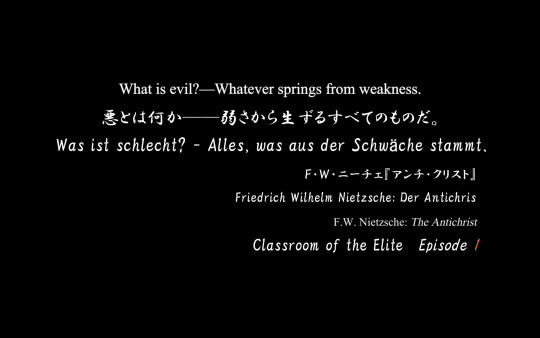
“What is evil? – whatever springs from weakness.”
F.W. Nietzsche: The Antichrist
“Nietzsche wrote "The Antichrist" to be first among a proposed gigantic work concerning the re-evaluation of all values. Through the contents of the book, we see that the first of those values which he wants to extinguish had strong ties to Christianity, either as an expression of its direct doctrines or in disguised forms within the philosophy of supposedly secular philosophers.”
Njoku, I. The antichrist summary. Book Analysis. https://bookanalysis.com/friedrich-nietzsche/the-antichrist/summary/
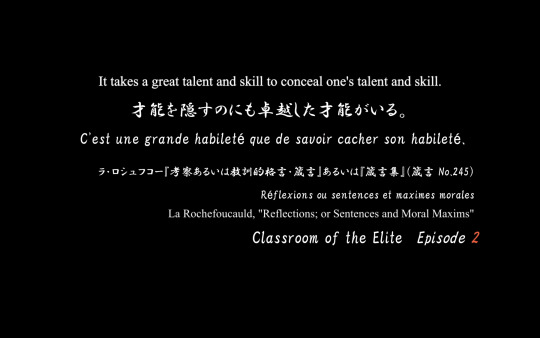
“It takes a great talent and skill to conceal one’s talent and skill.”
La Rochefoucauld, “Reflections; or Sentences and Moral Maxims”
* "This famed work by a noted French author of the Renaissance era, seventeenth-century nobleman François de La Rochefoucauld, offers hundreds of brief, brutally honest observations of humankind and its self-serving nature. The perfect read for any realist—or anyone with the desire to evaluate their moral standing—this edition includes three supplements with additional maxims and essays."
Summary by google books. https://books.google.com/books/about/Reflections.html?id=gn53DgAAQBAJ
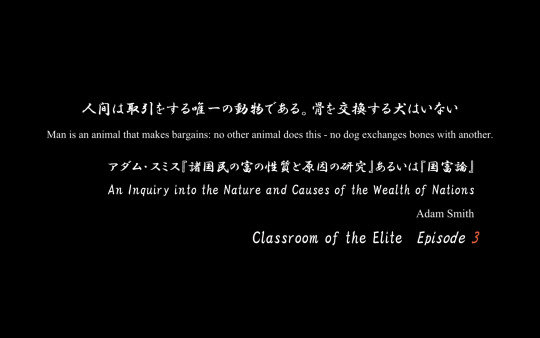
“Man is an animal that makes bargains: no other animal does this – no dog exchanges bones with another.”
An Inquiry into the Nature and Causes of the Wealth of Nation. Adam Smith
"An Inquiry into the Nature and Causes of the Wealth of Nations, generally referred to by its shortened title The Wealth of Nations, is the magnum opus of the Scottish economist and moral philosopher Adam Smith. First published in 1776, the book offers one of the world's first collected descriptions of what builds nations' wealth, and is today a fundamental work in classical economics. By reflecting upon the economics at the beginning of the Industrial Revolution, the book touches upon such broad topics as the division of labour, productivity, and free markets."
Summary by google books. https://books.google.com/books/about/An_Inquiry_Into_the_Nature_and_Causes_of.html?id=C5dNAAAAcAAJ

“We should not be upset that others hide the truth from us, when we hide it so often from ourselves.”
La Rochefoucauld, “Reflections; or Sentences and Moral Maxims”
*-
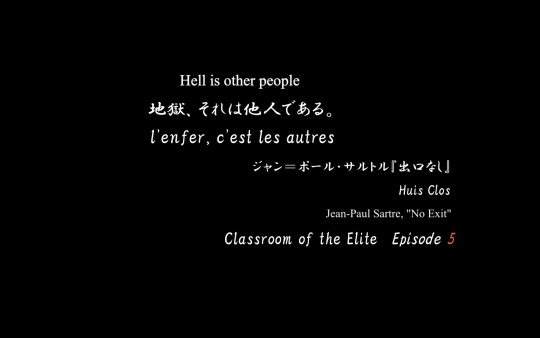
“Hell is other people”
Jean-Paul Satre, “No Exit”
"Two women and one man are locked up together for eternity in one hideous room in Hell. The windows are bricked up, there are no mirrors, the electric lights can never be turned off, and there is no exit. The irony of this Hell is that its torture is not of the rack and fire, but of the burning humiliation of each soul as it is stripped of its pretenses by the cruel curiosity of the damned. Here the soul is shorn of secrecy, and even the blackest deeds are mercilessly exposed to the fierce light of Hell. It is an eternal torment."
Summary by google books. https://books.google.com/books/about/No_Exit.html?id=QYhjF19zobIC
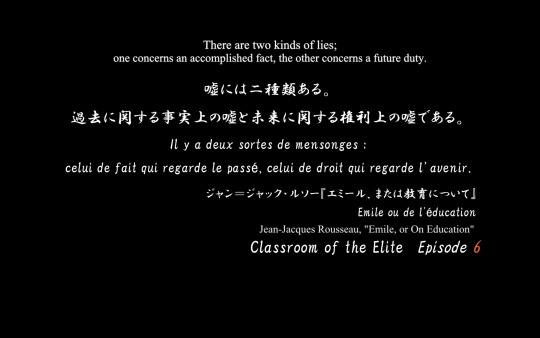
“There are two kinds of lies; one concerns an accomplished fact, the other concerns a future duty.”
Jean-Jacques Rousseau, “Emile, or On Education”
“Jean-Jacques Rousseau's 'Emile, or On Education' is a groundbreaking work that delves into the philosophy of education, focusing on the natural development of a child's own innate abilities. Written in a conversational style, Rousseau presents his ideas through the fictional character of Emile, a boy raised away from societal influences to emphasize the importance of education based on nature rather than traditional methods. . .”
Summary by google books. https://books.google.com/books?id=R0_mEAAAQBAJ
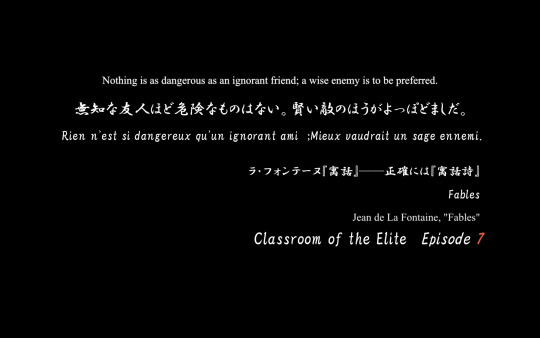
“Nothing is as dangerous as an ignorant friend; a wise enemy is preferred.”
Jean de La Fontaine, “Fables”
"Jean de La Fontaine collected fables from a wide variety of sources, both Western and Eastern, and adapted them into French free verse. They were issued under the general title of Fables in several volumes from 1668 to 1694 and are considered classics of French literature. Humorous, nuanced and ironical, they were originally aimed at adults but then entered the educational system and were required learning for school children."
Summary by wikipedia. https://en.wikipedia.org/wiki/La_Fontaine%27s_Fables
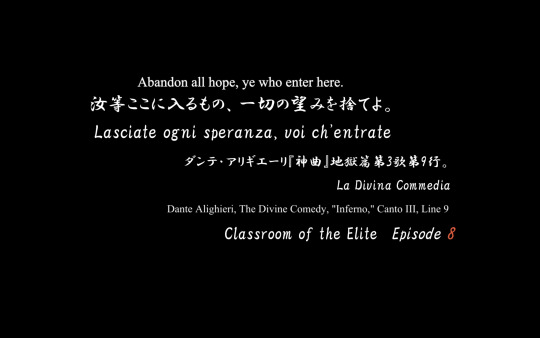
“Abandon all hope, ye who enter here.”
Dante Alighieri, The Divine Comedy, “Inferno,” Canto III, Line 9
“Thirty-five years old at the beginning of the story, Dante—the character as opposed to the poet—has lost his way on the “true path” of life; in other words, sin has obstructed his path to God. The Divine Comedy is the allegorical record of Dante’s quest to overcome sin and find God’s love; in Inferno, Dante explores the nature of sin by traveling through Hell, where evil receives punishment according to God’s justice. Allegorically, Dante’s story represents not only his own life but also what Dante the poet perceived to be the universal Christian quest for God. As a result, Dante the character is rooted in the Everyman allegorical tradition: Dante’s situation is meant to represent that of the whole human race. . .”
Summary by sparknotes. https://www.sparknotes.com/poetry/inferno/character/dante-alighieri/
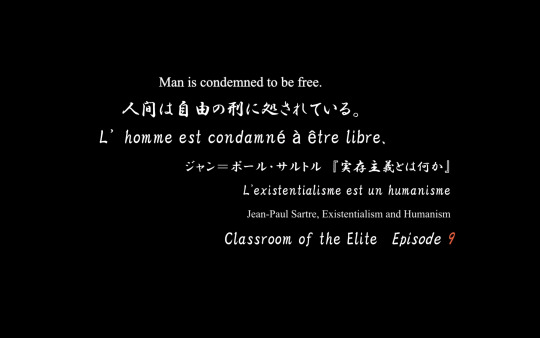
“Man is condemned to be free.”
Jean-Paul Sartre, Existentialism and Humanism
"Over the past sixty years the writings of Jean-Paul Sartre have probably been more influential in the West than those of any other philosopher and literary figure. In his theoretical writings, Sartre laid the foundation for an original doctrine of Existentialism. His concern, however, was to relate his theory to human response and the practical demands of living.”
Summary by google books. https://books.google.com/books/about/Existentialism_and_Humanism.html?id=vZs6PgAACAAJ
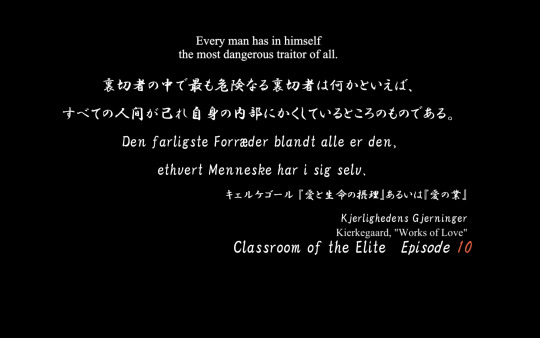
“Every man has in himself the most dangerous traitor of all.”
Kierkegaard, “Works of Love”
“One of Soren Kierkegaard's most important writings, Works of Love is a profound examination of the human heart, in which the great philosopher conducts the reader into the inmost secrets of Love. "Deep within every man," Kierkegaard writes, "there lies the dread of being alone in the world, forgotten by God, overlooked among the household of millions upon millions." Love, for Kierkegaard, is one of the central aspects of existence; it saves us from isolation and unites us with one another and with God. . .”
Summary by google books. https://books.google.com/books/about/Works_of_Love.html?id=_6OEccL5znEC
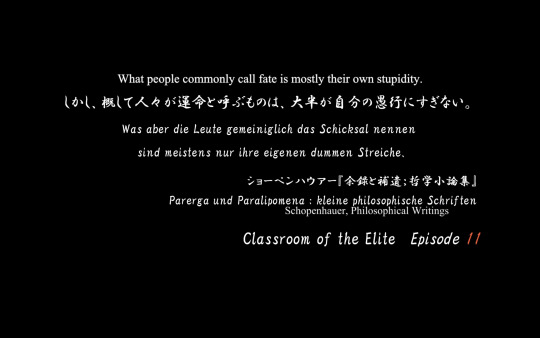
“What people commonly call fate is mostly their own stupidity.”
Schopenhauer, Philosophical Writings
“Arthur Schopenhauer was a German philosopher. He is known for his 1818 work The World as Will and Representation, which characterizes the phenomenal world as the manifestation of a blind and irrational noumenal will. Building on the transcendental idealism of Immanuel Kant, Schopenhauer developed an atheistic metaphysical and ethical system that rejected the contemporaneous ideas of German idealism. Schopenhauer was among the first thinkers in Western philosophy to share and affirm significant tenets of Indian philosophy, such as asceticism, denial of the self, and the notion of the world-as-appearance. His work has been described as an exemplary manifestation of philosophical pessimism. . .”
Summary by wikipedia. https://en.wikipedia.org/wiki/Arthur_Schopenhauer
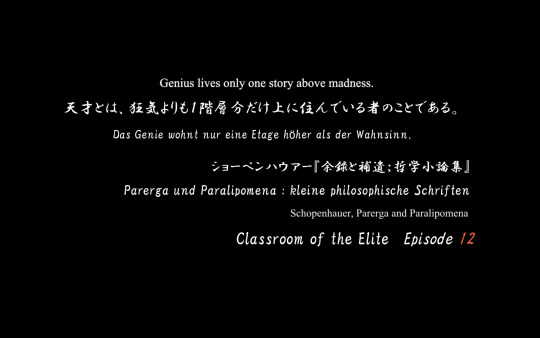
“Genius lives only one story above madness.”
Schopenhauer, Parerga and Paralipomena
“Parerga and Paralipomena (Greek for "Appendices" and "Omissions", respectively; German: Parerga und Paralipomena) is a collection of philosophical reflections by Arthur Schopenhauer published in 1851. The selection was compiled not as a summation of or introduction to Schopenhauer's philosophy, but as augmentary readings for those who had already embraced it, although the author maintained it would be comprehensible and of interest to the uninitiated nevertheless. The collection is divided into two volumes, covering first the parerga and thereafter the paralipomena to that philosophy. The parerga are six extended essays intended as supplementary to the author's thought. The paralipomena, shorter elaborations divided by topic into thirty-one subheadings, cover material hitherto unaddressed by the philosopher but deemed by him to be complementary to the parerga.”
Summary by wikipedia. https://en.wikipedia.org/wiki/Parerga_and_Paralipomena
congratulations on scrolling all the way down here! I included short summaries provided by the internet because I feel like they really help give a reason for wanting to read the entire media instead of just moving past after quote :)
can't wait to start reading!
11 notes
·
View notes
Text
So, something that irritates the ever-loving fuck out of me is when I'm chatting online with another woman/make a post about some feminist topic (for example, child marriage of underage girls to adult men, or female infanticide), and some stupid lefty moid jumps in with some dumbass comment about "oh, that doesn't happen here, that only happens in (name of foreign country or region of the globe)." Always with the tone and general insinuation of "oh, you don't know those women, that doesn't happen here, don't worry your pretty little head about it." And I'm just... ugh. I can't be the only white, Western woman who is disgusted by this patronizing and incredibly racist (not to mention misogynistic) "argument."
Not only is it not even necessarily true (if we stay on the topic of child marriage, for example, then we would have to acknowledge that there are multiple states right here in the U.S. where child marriage is perfectly legal with parental permission), but ALSO, even if that was the case, the insinuation is also that if a woman or girl is from a developing country, if she is poor, if she is a minority, if she is far away from where I am, then she is an acceptable target to be treated as lower than an animal and to be stripped of her human rights. That is disgusting. And often, these are the same moids who will join the libfems in shouting about "white feminism" and attempting to counter feminist arguments with some racialized psychobabble about black men or some shit (usually on a topic that affects black women just as much, if not more, than white women). Please. You don't care about racism; your attitudes about WoCs are incredibly racist. You're merely virtue signaling about MoCs, and we both know it. You don't actually care about them. As for women, no matter their color, class, or what country they live in, they deserve basic human rights as much as I do. Making not being denied basic rights into a privilege that is only to be enjoyed by white Westerners is disgustingly racist. And yes, I have every right to be concerned about women's treatment "over there", too, because I am a woman. Like, let's say that I wanted to travel. There are definitely places on the globe where I would feel unsafe traveling alone because of my sex (for example, Afghanistan). Why? Because women in those countries are treated horribly, and I wouldn't want that to happen to me. Their treatment still affects me, albeit indirectly, because of my sex class. It's fucking patronizing as hell to act like women who don't live there should just not worry our pretty little heads about a topic that limits all women (yes, some more so than others), just because some male decided that anything far away isn't relevant to him. It's still relevant to me; I am a woman, and all women deserve basic rights. The reason you're uncomfortable with me talking about it is because you're a misogynist, and you therefore don't think we do. You see women as property, and why, in your mind, would property deserve human rights? You would behave that way to us, too, if you were given the chance; the only reason you don't is because we have enough power here to stop you, and you don't want women there to get that kind of power, too, or else what would happen to your sex tourism plans or whatever? So, yeah. The argument is racist, it is patronizing, and it is deeply misogynistic. I have no interest as a woman in listening to that bullshit. Fuck off, moid.
10 notes
·
View notes
Note
you know just because you don't like girls with dick doesn't mean you need to trash on people that do. you're getting mad about death threats on twitter when there are laws across the world being developed or enacted prohibiting trans people from existing, i'm not gonna try to explain empathy to you tho. like its not that big of a deal dude lmao if someone makes you uncomfortable that's completely valid but there's no reason to just hate an entire people group because of some trauma you must have. someone's interpretation of womanhood shouldn't threaten yours
“just because you don’t like girls with dicks”
it’s not about “liking them” or not I am just a homosexual female, by nature I can’t be attracted to them and lesbians in general deserve a space without men.
“you're getting mad about death threats on twitter when there are laws across the world being developed or enacted prohibiting trans people from existing”
there are laws or push for laws to eradicate female spaces, include men in the female category, which pushes women out of opportunities in favor of men, and also laws that prohibits lesbians and women in general from gathering in spaces without men. this is not about “death threats” and me being an asshole, including men in the category of women threatens sex-based rights women fought hard for.
“i'm not gonna try to explain empathy to you tho.”
I do have empathy, I have empathy for women who are afraid of speaking up and are losing their sex-based rights, I have empathy for lesbians who are being sexually harassed and assaulted in “queer” spaces and being told their sexuality is not real/wrong, I have empathy for children who aren’t able to make decisions they don’t understand the consequences of, but are pushed to alter their bodies in irreversible ways because their mental health is not being addressed properly because it’s not profitable. the question is, do YOU have empathy?
“like its not that big of a deal dude Imao if someone makes you uncomfortable that's completely valid but there's no reason to just hate an entire people group because of some trauma you must have.”
as I explained this goes beyond a personal issue or discomfort, this impacts all women as we are all affected by the laws this movement is trying to force. women’s trauma are always minimized and treated as a personal incident or a failing rather than a pattern. women have the right to protect themselves from male violence, female spaces were not created for arbitrary reasons, they are necessary due to material reality.
“someone's interpretation of womanhood shouldn't threaten yours”
it does actually when men can legally change their gender to female for all the reasons I explained above, laws should be based on material reality not individual feelings. when men define womanhood as the state of being feminine it hurts all the girls and women who don’t conform to femininity.
language matters, anon is trying to frame this issue as me being a big hater who is irrational due to trauma or whatever but the reality is women have every right to speak up and protect our rights. they want women to be doormats and also they want us to do all the work of stripping our own rights away, that’s their version of “empathy” empathy is when women never have any self-preservation instincts and just serve men and their interests.
46 notes
·
View notes
Text

alright you guys wanted it , so here it is . below the cut is a " ( romantic ) shipping guide " for my muse , ryomen sukuna . this post will essentially detail anything i think is vital when being involved in a romantic relationship with him , or getting close to him at all .
beware , there is information under the cut about gore , violence , cannibalism , war , and terror . this man , this curse , isn't easy to stomach for most people and even less likely to romance . his information will not be typical , he isn't even human , he hasn't been human in three millennium at least . tread carefully . this will CONTAIN STORY SPOILERS .

first and foremost , ryomen sukuna is a human that existed 3000 years back during the heian era . this much is concrete canon , but here we'll get into headcanon territory and other noncanonical material , so do keep that in mind , this pertains to my headcanon ryomen sukuna compared to canon sukuna .
my ryomen sukuna's human years were spent as an instructor of jujutsu , much like satoru , working under the watchful eye of the surrounding society and bowing to their whims for some time . he only began to push his limits when he began to operate outside their rules ; developing a cursed technique , finding new methods to utilize cursed energy that was seen as troublesome and dangerous to be experimenting with at the time . though sukuna had a few students , he didn't have any near the end of his life as a human , and put forth all his energy into finding new and interesting ways to weaponize jujutsu and cursed energy . he was a master of it by the time that the elders found out what he was doing , planning to toppel the established government of the real , very much normal world , which meant killing the reigning emperor , emperor kammu .
however , since sukuna grew up during this time , he's well versed in all manner of poetry , most of all in haiku . although this isn't to say he was the one writing it , since he was the current most powerful sorcerer , many of those around him seek HIS hand rather than the other way around . so , that's to say ryomen is used to having women and men looking to court HIM rather than HIM having to do anything for anyone else . he refuted them all , of course , no matter how extravagant the display . he did not marry , he did not have children , he was the only ' sukuna ' , his lineage was dependent on him & him alone . he quite preferred it that way . that being said , he was quite the cultured individual , he attended plays and theater , spent his time mingling with the higher class and aristocracy . looking at him in modern day , it might be hard to imagine that people would once look forward to seeing him anywhere for any reason .
that is to say his first execution interrupted his plans & his reign as a sorcerer , and began his life as a curse . this is when his ' beautiful ' face was transformed , when he was stripped of his sorcerer prestige , but went on wrecking havoc as a curse . with uraume at his side , up until the day of his death , he finds himself in a sort of existential limbo . yet , thanks to sheer fortitude , he kept his sanity in tact until he was incarnated into the modern day .

in the modern day , much of what sukuna was once honored for is seen as barbaric and offensive , par for the course when dealing with the changing times . one of the few things that he's happy to have kept is the pretty face , or rather , happy to have acquired it . in the heian era , a pretty face was indicative of good nature , and he uses that to his advantage . getting him to approve and tolerate your muse isn't difficult , sukuna wouldn't say he's asking for too much ; just your absolute and utter loyalty and , if he can't have that , then what use are you ? if you're not powerful yourself , why should he regard you at all ?
he values power . raw , unadulterated , strength . but being that he is also a teacher , if he sees potential , he's not against helping and pointing out what you need to work on , like he does with megumi multiple times . just quit listening to that brain dead modern day sorcerer and listen to me . i can train you . i can help you . i can make you something worthy . he sees this as , not manipulating , but a genuine favor .
ryomen is also , like satoru , demiromantic . he has an interesting view on sexuality , especially since he sees it as a means to an end instead of romantic . so that brings us to his dates -- and his dates are simple , refined , but simple ; just being in the same room together is good enough , doing your own things , not necessarily together . he likes music , mostly traditional style . he is a big fan of peace and serenity , incense , candles , red lacquer , all those things are gifts that he would like .
that being said . he doesn't want to hear " oh how could you do this " or " that's terrible " when he's eating people and human limbs . it's a quick way to end up on the receiving end of dismantle . however , this does mean hearts , human hearts , are a big deal , and he'll accept them as gestures of romance . he'll be eating it though , as a reciprocation gesture .
he is terribly possessive though . and i mean possessive in a bad way . he'll chain you down if he thinks you might run away . or he'll break your legs if he gets even the inkling of a feeling that you'll flee . if he doesn't have your word , you're a liability . after all , that's another thing about sukuna ; he is lonely at the top , but he , unlike satoru , has accepted it , and accepted that no one will be capable of reaching him . it's simply not possible . simple humans , simple as ever , could not and would not ever be at his level . it's a sad , 3000 year realization .

#❪ ♥ ❫ ─── ⠀ ⠀‵⠀ out of character ⠀ 〳 ⠀ headcanons ‵#save .#❪ ♥ ❫ ─── ⠀ ⠀‵⠀ out of character ⠀ 〳 ⠀ general ‵
14 notes
·
View notes
Text
Shamima Begum has lost her latest bid to overturn the government’s decision to strip her of British citizenship, the Court of Appeal has ruled.
Ms Begum left the UK aged 15 with two other east London schoolgirls to travel to Syria in February 2015.
Last year, she lost a challenge against the decision at the Special Immigration Appeals Commission (SIAC).
Here are the key developments to date:
August 1999: Shamima Begum is born in England to parents of Bangladeshi heritage.
February 2015: British counter-terrorism police launched an international hunt to find three London schoolgirls who were making their way to the so-called Islamic State’s (Isis) territory in Syria.
Ms Begum, 15, had slipped out of her house in east London, with friends, Kadiza Sultant, 16 and Amira Abase. They caught a flight to Istanbul, Turkey and travelled to the Syrian border from there.
In late February, the Metropolitan police confirm that Begum and her friends had reached Syria. Ten days after arriving in the country, Shamima Begum marries Yago Riedijk, a Dutch-born convert to Islam and a convicted terrorist.
October 2017: A US-backed alliance of Syrian fighters takes full control of Raqqa, ending three years of Isis rule in the city.
13 February 2019: The Times’ war correspondent Anthony Loyd finds Ms Begum, then 19-years-old, at the al-Hawl refugee camp in Northern Syria. A pregnant Ms Begum tells him that she wants to return to the UK to raise her child but that she did not regret her decision to join Isis. She says that she had had two other children who died of malnutrition.
She says she had been unfazed by seeing the head of a beheaded man as he was an “enemy of Islam” but believes that Isis did not deserve victory.
Three days later, Ms Begum gives birth to a baby boy.
19 February 2019: The UK government serves notice that it intends to strip Ms Begum of her British citizenship.
The then-Home Secretary, Sajid Javid, writes to Ms Begum’s parents to inform them of his order to strip her citizenship. He believes that, because her parents are of Bangladeshi heritage, she can apply for citizenship of that country.
The law allows the government to remove citizenship if they can show the person behaved “in a manner which is seriously prejudicial to the vital interests of the UK” and when there is “reasonable grounds for believing that the person is able, under the law of a country or territory outside the UK, to become a national of such a country or territory.”
24 February 2019: Ms Begum’s father, Ahmed Ali, speaks to The Mail on Sunday and says that he “doesn’t have a problem” with his daughter’s British citizenship being removed.
Speaking from his home in Bangladesh, he said: “If she at least admitted she made a mistake then I would feel sorry for her and other people would feel sorry for her, but she does not accept her wrong.”
16 July 2020: The Court of Appeal rules that Ms Begum should be permitted to return to the UK in order to fairly contest the British government’s decision to revoke her citizenship. This ruling was appealed and sent to the Supreme Court.
26 February 2021: On February 26, the Supreme Court ruled unanimously against bringing Ms Begum back, thus reversing the previous decision.
15 September 2021: Ms Begum asks the British people for forgiveness in an interview with ITV. The now-22-year-old says that Isis’s killing of innocent people is “unjustifiable”.
She apologised for comments she had previously made to a BBC journalist about the Manchester Arena bombing. In 2019, she had claimed - when asked about the 2017 attack - that it was wrong to kill innocent people, but that Isis considered it justified as retaliation for coalition bombing of Isis-held areas.
She told ITV: “I do not believe that one evil justifies another evil. I don’t think that women and children should be killed for other people’s motives and for other people’s agendas.”
November 2022
Before the Special Immigration Appeals Commission (SIAC), Ms Begum’s counsel said: “Without seeking to investigate and determine, still less consider, whether she was a child victim of trafficking and whether there were failures by public authorities in the UK to prevent her being trafficked.”
January 2023
In the BBC podcast series, she said she understood public anger towards her but insisted she was not a “bad person”.
She said she accepted she was viewed “as a danger, as a risk”, but blamed her portrayal in the media.
February 22, 2023
Ms Begum lost her appeal in a SIAC court to overturn the government’s decision to strip her of her British citizenship.
October 2023
Ms Begum’s appeal against the loss of her British citizenship began in the Court of Appeal.
Begum’s team of barristers claim she was a victim of Isis propaganda and was groomed into terrorism.
Samantha Knights KC told the court the government had failed to consider the legal duties owed to Ms Begum as a potential victim of trafficking or as a result of “state failures” in her case.
February 2024
Three judges dismissed Ms Begum‘s bid at the Court of Appeal.
Giving the ruling, Lady Chief Justice Baroness Carr said: “It could be argued the decision in Ms Begum‘s case was harsh. It could also be argued that Ms Begum is the author of her own misfortune.
“But it is not for this court to agree or disagree with either point of view. Our only task is to assess whether the deprivation decision was unlawful.
6 notes
·
View notes
Text
"There is not a single European country in which the traditions of the old communal property have entirely disappeared. In certain areas, notably in the Ardennes and in the steep mountainous regions of Switzerland, where the peasants did not have to submit to the kind of oppression to which the German villagers were subjected after the wars of the Reformation, communal property is still widespread enough to constitute a considerable part of the territory.
In the Belgian Ardennes, the collective lands are composed of three parts: the woods, the freshly cleared ground [sart], and the pastures. They also often include arable land and quarries.
(...)
These customs clearly influence the moral character of individuals and greatly develop their spirit of solidarity, mutual kindness, and heartfelt friendliness. Thus it is customary to form voluntary work crews for the benefit of those who need work done. The latter need only to state their request by proceeding noisily through the village, calling out, “So-and-so needs something done! Who wants to help out?” Immediately a group appears and its members put their heads together to figure out who can best undertake the job, and the service is rendered. Such stories also come to us from the Queyras.
In all of Switzerland, two-thirds of the alpine prairies and forests belong to the communes, which also own peat bogs, reed marshes, and quarries, as well as fields, orchards, and vineyards. On many occasions when the co-proprietors of the commune have to work together, they feel as though they are at a festival rather than at work. The young men and women climb to the high mountain pastures, driving their herds before them to the harmonious clinking of the bells. At other times, the work is more difficult. While the snow still covers the ground, the woodsmen, armed with axes, cut the high pines in the communal forest. They strip the sawlogs and slide them down the avalanche corridors to the torrent that will carry them away in its bends and rapids.
Then there are the evening gatherings on winter nights, in which all are summoned to the home of whoever has the most urgent work, whether it is to shell corn, hull nuts, or make wedding gifts for a woman engaged to be married. During these gatherings, the work is a pleasure. The children want to participate, for everything is new to them. Instead of going to bed, they stay up with the adults and are given the best of the chestnuts roasting under the hot embers. When dreamtime is near, they listen to songs and are told stories, adventures, and fables, which are transformed by their imaginations into marvelous apparitions. It is often during such nights of mutual good will that a child’s being permanently takes shape. Here, one’s loves in life are kindled, and life’s bitterness is made sweeter.
Thus the spirit of full association has by no means disappeared in the communes, despite all the ill will of the rich and the state, who have every interest in breaking apart these tightly bound bundles of resistance to their greed or power and who attempt to reduce society to a collection of isolated individuals. Traditional mutual aid occurs even among people of different languages and nations. In Switzerland, it is customary to exchange children from family to family, between the German and the French cantons. Similarly, the country people of Béarn send their children to the Basque country, welcoming in turn young Basques as farm boys. In this way, they will all soon learn the two languages without the parents having to spend any money. Finally, all individuals with a similar trade and common interests—whether they be coal merchants, hunters, or sailors—have established virtual confraternities having neither written constitutions nor signatures, but nevertheless forming small, close-knit republics. Throughout the world, carnival performers who meet by chance on the road are allied in a sort of freemasonry that is far more solemn than that of the “brothers” who gather in the temples of Hiram."
-Elisée Reclus, "Culture and Property" (1905)
7 notes
·
View notes